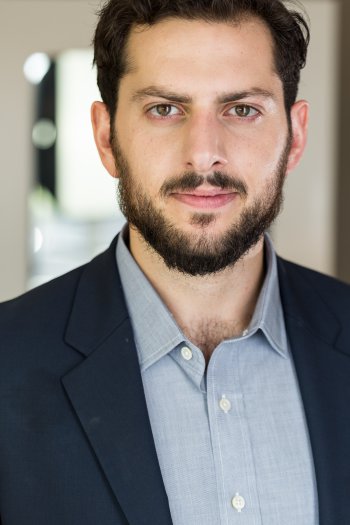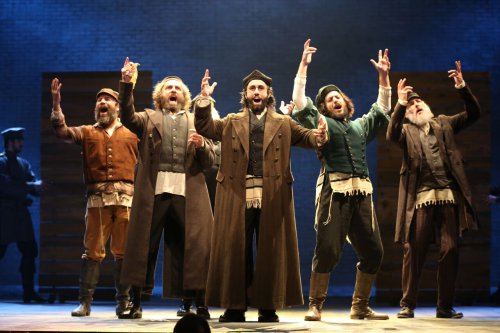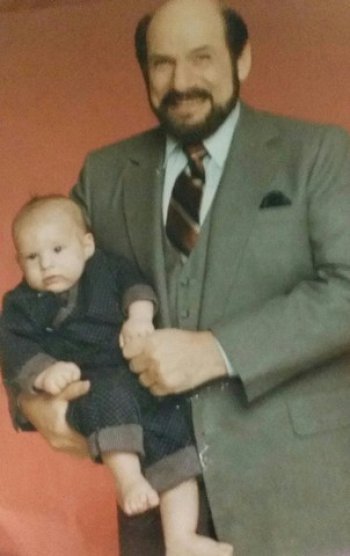Michael C. Bernardi: An Actor and His Legacy
Broadway Actor Michael C. Bernardi discusses the legacy of his late father, life on a Broadway stage, and his observations about the differences between the acting business in New York City and Los Angeles.

Michael C. Bernardi (Photo credit: Jeremy Folmer)
[avatar user=”Ryan Mikita” size=”96″ align=”left”] Ryan Mikita[/avatar]Michael C. Bernardi has had interesting path to Broadway. Born and raised on the outskirts of Beverly Hills, CA, Michael’s father passed away when Michael was only two years old. His father–Herschel Bernardi–left behind a legacy on stage and film in both LA and NYC, and he most notably played Tevye in the second Broadway revival of Fiddler on the Roof. How ironic it is, then, that Michael finds himself on the Broadway stage swinging for the role that his late father played nearly 35 years earlier.
Theaterscene.net had the chance to discuss with Michael the legacy of his father, his path to Broadway, and the differences in the acting business between the East and West Coasts.
This Interview has been edited for clarity and length.
TheaterScene.net: What was it like growing up in LA?
It’s made up of so many different communities with their own identity. Really, it’s a very transient city. So a lot of people are having their “Los Angeles” period in their lives. So growing up, you kind of had a new family every few years because people were coming in and coming out.
I’d say it was Beverly Hills adjacent, kinda like the slums of Beverly Hills. My mom wanted me to go to the Beverly Hills school district, and LAUSD can be tough. I was in LAUSD from about Kindergarten to sixth grade, and there were a lot of kids that were coming to school from foster homes and gangs. I had a couple of teachers that were not really there to teach, but rather to keep everybody in line–overcrowded classrooms, etc.
So my mom moved just close enough to Beverly Hills to at least pretend that we were a part of the district.
TS: You started out doing Stand-up comedy in LA when you were 8 years old, how did that happen?
I connected with adults as a kid–I wasn’t very good at sports, so I really enjoyed a nice conversation and I loved telling jokes at parties. A friend of my moms found a stand-up comedy class for kids, so my mom asked me if I wanted to do it. It ended up fitting like a glove.
We had this one performance–a culminating performance on a Saturday night. Basically, it was a class of ten kids, and about eight of them couldn’t even make it on stage, they were terrified–as they should be, we were all children! But it was me and this other kid that made it on stage. The other kid couldn’t make it through his act. I made it through my act and got a great response. I attribute it to the fact that no one knew that I needed glasses until I was about 11 years old. Since I couldn’t see the expressions on the faces of the audience members, I was just listening to the laughs. I was just looking into the lights, and I felt fearless up there.

Michael C. Bernardi in a scene from the 2015 Broadway revival of “Fiddler on the Roof” (Photo credit: Joan Marcus)
TS: Do you remember any of the jokes from your set?
I used to open my set with “My name is Michael Bernardi, I’m eight years old, and I have a bad life.”
What an ironic sense of humor for an eight year old! It’s also a perfect segue to my next question. At eight years old, did you find it was a hard thing to talk about your late father and his passing?
I’ve always felt my father very present in my life, and I think because in a lot of ways he left behind a pretty wonderful legacy–and there were a lot of people who adored him–I grew up with a lot of different people telling me stories of how great he was. And so I think I always had such a positive vision of him that I always felt like he was looking out for me.
TS: Do you think his career influenced your path into the arts?
Absolutely. My father grew up in the Yiddish Theater, and his family was a bunch of Yiddish theater actors–my grandfather and grandmother were both actors, and so being raised in that environment, my father was on stage even as a baby. By the time he was four or five, he had this really powerful voice, and he was singing on stage by the time he was four. And I think growing up in that environment–even though he was gone–there were still a lot of friends and family members that were still around and they were always performing. They were always cracking a joke or doing a vaudeville sketch. As a kid it seemed like a lot of fun, and I think it happened in a very organic way.
It’s a question that I ask myself. When you are in school you always get the question, “so why do you want to be an actor?”, and everyone always tries to answer that question in the most profound way. And yes, that’s beautiful and part of it, but Laurence Olivier himself [in response to the question] said “Look at me, look at me, look at me,” and somewhere in between the two is the truth. There is the noble side of having pride in telling stories, and then there is the “look at me” side of things. And both are totally valid! You know, to have a long career in acting, I think you need a lot of reasons to keep going.
TD: So when did Music Theater come into the picture?
I did music theater in high school–I shapoopied in The Music Man [laughs]. But one day after performing in comedy clubs for a couple of years and receiving a good response, things started getting more professional. When I first got into music theater, it was nice to get back on stage, but at first it wasn’t really my heart. Really when I got into my junior year in high school, I discovered just doing straight plays. I remember House of Blue Leaves, and that was really a life-changing moment. I was finally performing in something where it wasn’t a constant search for getting a laugh, and it was just about being and telling a story. So because of this discovery I studied straight acting at SUNY Purchase.

Baby Michael with his father Herschel Bernardi
TS: After school you graduated and started out back on the West Coast. What did you find about the acting business in LA?
I started out in LA at a time that was in the middle of the recession, and post-writers’ strike. In a lot of ways, it took a few years for LA to recover from that–studios were moving out of town, everything was becoming digital, and network television was becoming weaker. There was just less work all around. I would say the biggest difference between New York and LA is that in LA, it’s harder to get seen. LA is very much a credits game. You go to an audition in LA, and the first thing people are going to ask you is “Okay so what have you done?”. And so, as insane as cattle calls in New York can be, you can be seen by and actually meet a powerful casting director. In a way, it’s not as accessible.
TS: How has your life changed since you’ve become a Broadway actor?
I had thought that Fiddler might be something that made its way into my life way into the future. I was out in LA trying to be an actor–I was writing web series, creating sketches, doing anything and everything, and ultimately got to the point where I would get so close to booking something that when I wouldn’t get the part I would get way down in the dumps. So I thought, where can I find some stability in this crazy thing called “being an artist.” So I decided to go to grad school. Then I could at least teach. So I was in grad school over at USC for about two years, and while I was there it seemed like the business in LA really started to turn around–everyone was getting the opportunities they had been waiting for. So I got this feeling that things are picking up, and now I’m trapped inside school. Ultimately, I felt like I was hiding in that program. I realized that I wasn’t actually trying–I wasn’t really putting myself out there when it came to showcases, being seen by casting directors, anything. I started to feel that if I’m really going to call myself an actor, then I’ve got to get myself past a certain level or standard to be able to really call myself one–a justification.
It’s an interesting thing. I’m on Broadway now. And I always thought that Broadway would be the ultimate justification of my career of an actor. But it is eight shows a week! You aren’t going to feel good about every single performance when you are performing that many times a week. I found that a big part of being on Broadway is really coming to terms with accepting yourself, and accepting the fact that there are going to be days where you don’t feel worthy of a Broadway stage–or any stage. As I started to find that sense of acceptance, I realized that my sense of success as an actor isn’t about how I hit a note, or a step, or got a laugh, it’s really about the pride in accepting myself on a daily basis. Since I’ve found this, I’ve noticed that the performance does feel better and lighter.
TS: Thanks for your time, Michael!






I know this is something that might be a little delicate.
I saw your Dad on the old rerun of peter gun. I couldnt get over how much he looks like Vin Desial(Mark Sinclair.)
In your dads younger picts. Mark and his twin never knew who thier father was. he also lived in la and new york. I wondered if you two might be related . might be interesting to see what a dna test might uncover.
Again im sorry if i have
Offended any one. I just was astounded in the mirror image .